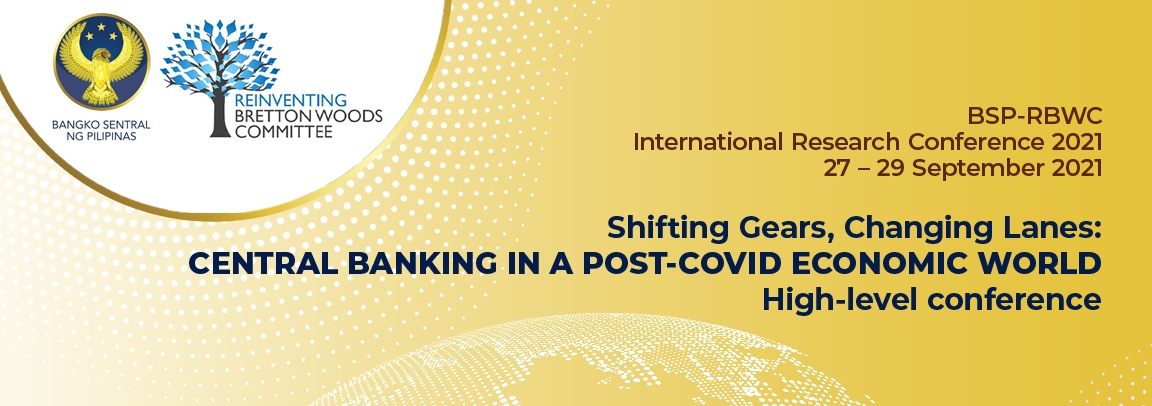
Recorded conference sessions are available at:


About the Conference
Cognizant of the rapidly evolving policy environment, this high-level conference will cover the following topics: (1) central banking and dealing with the enduring impact of COVID-19; (2) new monetary policy era for emerging markets; (3) forecasting future crises; (4) payment innovation, financial inclusion and financial stability risks; (5) monetary sovereignty and the path towards the digitalization of money; (6) climate change risk as a redefining issue for financial stability; and (7) the global economy post-COVID.
The BSP International Research Conference is a biennial event that engages central banks and leading experts from academia in the discussion of emerging and pressing policy issues. The 2021 conference marks the first time that the
Bangko Sentral ng Pilipinas (BSP) is joined by the
Reinventing Bretton Woods Committee (RBWC). The partnership could not have been more timely. The breadth and depth of the COVID-19 crisis have profound social, health, economic, and geopolitical ramifications. Central banks are confronted with multiple policy issues that may persist in the years to come and can, potentially, serve as fodder to future crises.
Day 1: 27 September 2021, Monday
Welcome Statement ≫
Opening Remarks ≫
Session 1: (Panel) Central Banking and Dealing with the Enduring Impact of COVID-19 ≫
Session 2. (Panel) New Monetary Policy Era for Emerging Markets ≫
Day 2: 28 September 2021, Tuesday
Session 3: (Lecture) Forecasting Future Crises ≫
Session 4. (Panel) Payment Innovation, Financial Inclusion and Financial Stability Risks ≫
Session 5. (Panel) Monetary Sovereignty and the Path towards Digitalization of Money ≫
Session 6. (Keynote Lecture) Central Banking in a Post-COVID Economic World ≫
Session 7. (Panel) Climate Change Risk as a Redefining Issue for Financial Stability ≫
Day 3: 29 September 2021, Wednesday
Session 8: (Lectures) The Global Economy Post-COVID ≫
Concluding Remarks ≫
27 September 2021, Monday | 14:30-14:35 (MANILA) | 08:30-08:35 (CET) ≫


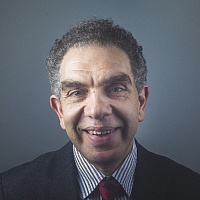
Marc Uzan
Executive Director, Reinventing Bretton Woods Committee
Marc Uzan is the Executive Director and founder of the Reinventing Bretton Woods Committee (RBWC), a not-for-profit organization established in 1994 that focuses on addressing issues related to the international financial architecture. Mr. Uzan has edited several volumes on international finance including the most recent volumes entitled “Bretton Woods: The Next 70 Years” and “The 10 Years After: The End of the Familiar” with contributions by major economic experts. He also authored academic papers on the new architecture for the international financial system and has written extensively about economics and finance in the popular press. Mr. Uzan holds a master’s degree in International Economics and Finance from the Université de Paris IX Dauphine. He had been a visiting scholar at the Department of Economics of the University of California, Berkeley and a visiting fellow at Harvard University.
OPENING REMARKS
27 September 2021, Monday | 14:35-14:45 (MANILA) | 08:35-08:45 (CET) ≫
Benjamin Diokno
Governor, Bangko Sentral ng Pilipinas
Dr. Benjamin E. Diokno is the Governor of the Bangko Sentral ng Pilipinas (BSP). Prior to his appointment, he served as Budget Secretary in three different administrations.
As Governor, he does not only pursue the promotion of the BSP mandates of price stability, financial stability, and an efficient payments and settlements system; but also endeavors to bring central banking closer to the people. He champions financial inclusion through digital payments and aims to shift 50% of retail payment transactions to digital form and achieve 70% transaction account ownership among adult Filipinos by the end of his term.
Video: Welcome Statement and Opening Remarks
DAY 1 - SESSION 1. (PANEL) CENTRAL BANKING AND DEALING WITH THE ENDURING IMPACT OF COVID-19
27 September 2021, Monday | 15:00-16:30 (MANILA) | 09:00-10:30 (CET) | 10:00-11:30 (TEL AVIV) ≫
In the early months of 2021, world economies have started showing signs of recovery. However, these recoveries are multispeed and divergent, and as uncertainty remains elevated, countries continue to support their economic outlook with fiscal and monetary stimuli. While the currently easy financial conditions remain supportive of the economy, central banks are increasingly concerned with the risk of global financial instability. Due to improving economic conditions in some advanced economies, longer term interest rates have started rising. This could lead to the repricing of risk and eventually a tightening of financial conditions that could adversely affect the domestic economy. Some central banks have also started looking at the potential long-term damages or scars of the pandemic. Allowing the scars to persist could result in lower growth potential and this has implications on central banks' monetary policy.


Eli Remolona
Professor of Finance and Director of Central Banking, Asia School of Business
Eli Remolona is Professor of Finance at the Asia School of Business in Kuala Lumpur. He sits on the Council of Advisers of the Academy of Finance in Hong Kong. Mr. Remolona spent most of his career in central banking, 14 years of it at the New York Fed and 19 years at the Bank for International Settlements (BIS). At the BIS, he was Head of Financial Markets, Editor of the BIS Quarterly Review and Chief Representative for Asia and the Pacific. He holds a Ph.D. in economics from Stanford University.
Panelists:
Signe Krogstrup

Governor, Danmarks Nationalbank
Signe Krogstrup is a Member of the Board of Governors of Danmarks Nationalbank. Ms. Krogstrup has extensive experience in economic research and monetary policy. Prior to joining Danmarks Nationalbank in June 2019, she held an adviser position and was member of senior management in the Research Department of the International Monetary Fund (IMF). From 2007 to 2016, she worked at The Swiss National Bank. Ms. Krogstrup holds an MSc in Economics from the University of Copenhagen and a PhD in International Economics from The Graduate Institute of International and Development Studies in Switzerland.
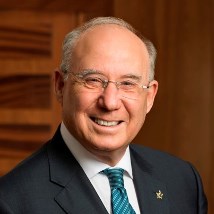
Jacob Frenkel
Former Governor, Bank of Israel
Dr. Jacob A. Frenkel is Chairman of the Board of Trustees of the Group of Thirty (G-30). Previously he was Chairman of JPMorgan Chase International (2009-2020), Vice Chairman of AIG (2004-2009), and Chairman of Merrill Lynch International (2000-2004). He was Governor of the Bank of Israel (1991-2000), the Economic Counselor and Director of Research at the IMF (1987-1991), and Professor of Economics at the University of Chicago (1973-87). He is a Fellow of the Econometric Society, a life-time Fellow of the International Economic Association, a Foreign Honorary Member of the American Academy of Arts and Sciences, a member of the Board of Directors of the National Bureau of Economic Research, and of the Peterson Institute for International Economics, and a Global Member of the Trilateral Commission. He is a Laureate of the 2002 Israel Prize in Economics, and a recipient of several Honorary Doctoral degrees and other decorations and awards. He is Chairman of the Board of Governors of Tel Aviv University, and Chairman of the Frenkel-Zuckerman Institute for Global Economics. He holds a B.A. in economics and political science from the Hebrew University of Jerusalem, and an M.A. and Ph.D. in economics from the University of Chicago.
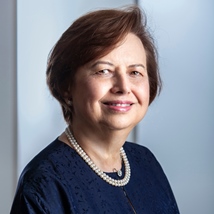
Zeti Aziz
Former Governor, Bank Negara Malaysia
Dr. Zeti Aziz is a career central banker who served as the Governor of Bank Negara Malaysia from 2000 to 2016. She had an important role in successfully managing the 1997-1998 Asian Financial Crisis in Malaysia and the country’s strong economic recovery thereafter. She was also instrumental in transforming the Malaysian financial system and building its robust resilience. She was active in strengthening regional cooperation and was unrelenting in working for ASEAN and East-Asian regional financial integration. She was also a voice for the emerging world concerning many global issues. She is currently the Co-chair of the Board of Governors of Asia School of Business in collaboration with MIT Sloan.
DAY 1 - SESSION 2. (PANEL) NEW MONETARY POLICY ERA FOR EMERGING MARKETS
27 September 2021, Monday | 17:00-18:30 (MANILA) | 16:00-17:30 (JAKARTA) | 11:00-12:30 (CET) | 13:00-14:30 (YEREVAN) ≫
The COVID-19 pandemic has forced governments to spend heavily to mitigate its adverse effects. As the extraordinary impact of the crisis calls for extraordinary measures, most central banks resorted to unconventional monetary policy (UMP) measures. These were proven to be effective as they were able to influence financial conditions and restore market confidence. Due to their effectiveness, some central banks are considering these UMPs to become part of their normal toolkit even after the pandemic. However, the effectiveness of these UMPs is found to be diminishing with long term side effects (Borio, 2020). For instance, while the extensive purchases of government bonds are not considered by central banks as a conduct of monetization, these could still challenge central bank independence and credibility. The significant UMPs implemented during the pandemic have also diminished the policy room of central banks to maneuver, making their economies exposed and vulnerable (Borio, 2020).
Francisco Dakila, Jr.
Deputy Governor, Bangko Sentral ng Pilipinas
Dr. Francisco G. Dakila, Jr. is the Deputy Governor of the Monetary and Economics Sector of the Bangko Sentral ng Pilipinas (BSP). Prior to his appointment as Deputy Governor, he was the Assistant Governor of the Monetary Policy Sub-Sector of the BSP. Before joining the BSP, he worked at the US Agency for International Development (USAID) and at the Agricultural Credit Policy Council. He received his Ph. D. and MA in Economics and B.S. in Economics (magna cum laude) from the University of the Philippines-School of Economics. He is a lifetime member of the Philippine Statistical Association (PSA) and the Philippine Economics Society (PES). He is also a member of the International Input-Output Association.
Perry Warjiyo
Governor, Bank Indonesia
Perry Warjiyo is the incumbent Bank Indonesia (BI) Governor for the 2018-2023 period. Prior to his appointment as Governor, he served as BI Deputy Governor from 2013-2018. He also held the position of Assistant Governor for Monetary, Macroprudential and International Policy after serving as Executive Director of the Economic Research and Monetary Policy Department of BI. Mr. Warjiyo served as Executive Director in the International Monetary Fund (IMF) from 2007-2009. He has enjoyed a long and brilliant career at BI since 1984, with a focus on economic research and monetary policy, international issues, organizational transformation and monetary policy strategy, central banking education and research, foreign exchange and external debt management.
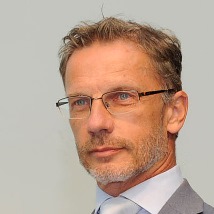
Boris Vujčić
Governor, Croatian National Bank
Boris Vujčić holds a PhD in Economics from the University of Zagreb. He has also received diplomas in Economics from the Montpellier University (France) and was a pre-doctoral PhD Fulbright student at the Michigan State University. He joined the Croatian National Bank (HNB) in 1996 and was Director of the Research Department before becoming Deputy Governor in 2000, a position to which he was re-appointed in 2006. In July 2012, Mr Vujčić became the Governor of the HNB for a six-year term of office and was re-appointed for another six-year term in July 2018. Mr Vujčić was a Deputy Chief Negotiator in Republic of Croatia’s negotiations with the European Union from 2005 to 2012. He won recognitions as the best governor in Central and Eastern Europe by Emerging Markets magazine in 2018, as well as the best world governor by The Banker (Financial Times) in 2019. In 2021, he was awarded with the prestigious Lamfalussy Award for lifetime achievement in the field of finance. Mr Vujčić’s fields of expertise are macro and monetary economics, international finance and labor economics.

Tomáš Holub

Board Member, Czech National Bank
Tomáš Holub graduated from the Institute of Economic Studies at the Faculty of Social Sciences, Charles University, where he obtained a bachelor’s degree in economics (1995), a master’s degree in finance and banking (1997) and a Ph.D. in theoretical economics (2001). He worked as a macroeconomist at Komerční banka from 1996 to 2000. He joined the Czech National Bank (CNB) as adviser to the Deputy Governor and the Governor and later became the Executive Director of the Monetary and Statistics Department from 2004 to March 2015 and the Executive Director of the Monetary Department from April 2015 to November 2018. He also lectures in monetary economics and international macroeconomics at the Institute of Economic Studies at the Faculty of Social Sciences, Charles University. He regularly publishes articles on inflation targeting, exchange rate issues, central bank independence and transparency, central bank finances and price convergence in domestic and foreign economic journals. Mr. Holub became a member of the Bank Board of the CNB in December 2018.
Martin Galstyan

Governor, Central Bank of Armenia
Martin Galstyan is the Governor of the Central Bank of Armenia. Before joining the Board, he held numerous executive positions at the Bank, namely, Director of research and training center in Dilijan, Head of Statistics department and Head of reserves management. He teaches numerous courses at the American University of Armenia. The flagship course is the “Microeconomics of Competitiveness” which is taught in affiliation with Harvard Business School. He is the first recipient of the Excellence in Teaching Award at the American University of Armenia. Mr. Galstyan holds postgraduate degree from John F. Kennedy School of Government at Harvard University.
DAY 2 - SESSION 3. (LECTURE) FORECASTING FUTURE CRISES
28 September 2021, Tuesday | 09:00-10:00 (MANILA) | 21:00-22:00 (EST, 27 September) ≫
Forecasting future crises is one significant issue in the study of macroeconomic stability. A forecasting economic model provides an analytical tool for policy makers to take pre-emptive actions against an impending crisis to mitigate economic fallout. However, forecasting future crises is more than just identifying a set of factors leading to a crisis. Forecasting in times of pandemic is more challenging due to a number of uncertainties.


Maria Almasara Cyd Tuaño-Amador
Deputy Governor, Bangko Sentral ng Pilipinas
Since joining the Bangko Sentral ng Pilipinas (BSP), Dr. Maria Almasara Cyd N. Tuaño-Amador has been involved in economic research in various capacities. Until her early retirement from the BSP in January 2015, Dr. Amador oversaw the Department of Economic Research, Department of Economic Statistics, Center for Monetary and Financial Policy, and Economic and Financial Learning Center. From 2003 to 2006, Dr. Amador was seconded to the International Monetary Fund. From 2015 to 2017, Dr. Amador was a member of the Advisory Panel of the ASEAN+3 Macroeconomic Research Office (AMRO). In January 2017, she rejoined the BSP as Deputy Governor for the Corporate Services Sector. As the head of this sector, she exercises oversight of Comptrollership and Management Services as well as the Research Academy and Provident Fund Office.
Claudia Sahm

Senior Fellow, Jain Family Institute
Claudia Sahm is a Senior Fellow at the Jain Family Institute, the founder of Stay-at-Home Macro Consulting, and a regular contributor at Bloomberg Opinion. She has policy and research expertise in macroeconomics, consumer spending, and household finance. She created the "Sahm Rule," an automatic trigger for stimulus payments in recessions. Previously, she was a section chief at the Federal Reserve, where she oversaw the Survey of Household Economics and Decisionmaking. Prior to this, she worked for ten years on the staff’s macroeconomic forecast. She was also a senior economist at the Council of Economic Advisers. Ms. Sahm holds a PhD in Economics from the University of Michigan (2007), and a bachelor’s degree in economics, political science, and German from Denison University (1998).
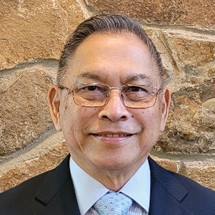
Roberto Mariano
Professor Emeritus, University of Pennsylvania>
Dr. Roberto Mariano is Professor Emeritus of Economics at the University of Pennsylvania, where he has been with the faculty since 1971. He was also the founding Dean of the School of Economics and Vice Provost for Research at Singapore Management University in 2002-2010. He is an elected Fellow of the Econometric Society. He has served in editorial boards of international journals in economics and statistics and he has published extensively on econometric methodology in top-tier international journals. He has been a consultant to multinational institutions, central banks, government agencies, and private companies in Asia and the United States, with a focus on econometric methodology and applications. Since the 1990s, he has had research consultancies with the Bangko Sentral ng Pilipinas (BSP) to develop BSP’s quantitative modelling toolkit for policy planning and forecasting needs. Currently, he serves in the Research Experts Panel of BSP, which is the international advisory body for BSP’s research program.
DAY 2 - SESSION 4. (PANEL) PAYMENT INNOVATION, FINANCIAL INCLUSION AND FINANCIAL STABILITY RISKS
28 September 2021, Tuesday | 15:00-16:30 (MANILA) | 09:00-10:30 (CET) | 10:00-11:30 (TALLINN) | 11:00-12:30 (ABU DHABI) ≫
In the last decade, the financial services industry has evolved at a rapid pace and one of the main drivers are advancements in technology. The COVID-19 pandemic further accelerates this digital transformation of financial services landscape with the introduction of innovations, especially in payment ecosystem, like contactless payments, digital banking and e-commerce, which have facilitated the promotion and advancement of financial inclusion agenda, particularly in developing economies. However, the digital innovations brought by large FinTechs and BigTechs (sometimes called non-financial conglomerates) are disrupting the traditional financial ecosystem by unbundling and reassembling financial services. They often act as intermediaries to provide solutions to customers in real-time without having to use their own balance sheets. Unlike banks and non-bank financial institutions, FinTechs and BigTechs are outside the regulatory ambit of central banks. These players are introducing pioneer innovative financial services and products and new integrated business models in the digital finance space. Moreover, these entities are capturing enormous personal data that could be used for credit scoring. These developments add another layer of complexity that may require financial authorities to redefine financial supervision and regulations in order to manage any financial stability risks that may arise. Also, the protection and security of personal data would require further understanding and coordination with competition and data protection authorities. Central banks need to recalibrate the process of obtaining market information, having historically relied on data from the balance sheets of financial institutions.


Chuchi Fonacier
Deputy Governor, Bangko Sentral ng Pilipinas
Chuchi G. Fonacier is the Deputy Governor of the Financial Supervision Sector, which is mainly responsible for the regulation of banks and other BSP-Supervised Financial Institutions (BSFI). She joined the BSP in 1984 as a bank examiner and worked her way to become deputy governor in 2017. Under her direct supervision are four subsectors which handle onsite examination and offsite surveillance of BSFIs including specialized supervision of specific areas (i.e., anti-money laundering, trust, financial market operations and information technology), policy studies/research, and supervisory data management.
Madis Müller

Governor, Bank of Estonia (Eesti Pank)
Madis Müller leads Eesti Pank and is a member of the European Central Bank (ECB)’s Governing Council, the highest decision-making body of the ECB that sets monetary policy for the euro area. Mr Müller became the Governor of Eesti Pank in June 2019. He was previously the Deputy Governor of Eesti Pank, a portfolio manager for equity investments at the International Finance Corporation (IFC), an advisor to the Executive Director of the Nordic-Baltic constituency at the World Bank, and an economic policy adviser to the Prime Minister and the Minister of Finance of the Republic of Estonia. Mr. Müller holds a Master’s in Finance degree from the George Washington University in the USA and a bachelor’s degree in banking and finance from Estonian Business School. He is also a CFA (Chartered Financial Analyst) and FRM (Financial Risk Manager) charter holder.
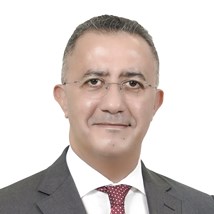
Mehdi Manaa

Chief Executive Officer, BUNA (Arab Regional Payment and Clearing Settlement System)
Mehdi Manaa was appointed as the CEO of BUNA (The Arab Regional Payments Clearing and Settlement Organisation) in January 2020. Prior to his appointment, Mr. Manaa served as the Deputy Director General of the Market Infrastructure and Payments Directorate General at the European Central Bank (ECB). During his 12-year tenure at the ECB, Mr. Manaa held several other roles, including heading the Market Infrastructure Development Division as well as the T2S Programme, a program which he was involved in since its inception. Prior to his career at the ECB, Mr. Manaa held various managerial and advisory positions in the private sector, focusing on payment solutions and financial market infrastructures.

Sopnendu Mohanty
Chief Fintech Officer, Monetary Authority of Singapore
Sopnendu Mohanty is the Chief Fintech Officer at the Monetary Authority of Singapore (MAS). He joined MAS in August 2015 and is responsible for creating development strategies, public infrastructure and regulatory policies around technology innovation. Since 2015, Singapore has become one of the top global fintech hubs covering a wide range of financial asset classes, including adjacent technology innovations in areas such as insurance, digital assets, blockchain, artificial intelligence, reg-tech and green-finance. Before joining MAS, Mr. Mohanty spent more than 20 years in various leadership roles in technology, finance and innovation with most of his career with Citigroup. He is a member of multiple advisory committees of multilateral global agencies, associations, universities, and governments. He is also an avid speaker, global thought leader in FinTech, and advocate of accelerated transformation to a digital economy for solving financial inclusion and sustainability challenges.

Colin Pou
Executive Director, Financial Infrastructure, Hong Kong Monetary Authority
Colin Pou holds a Bachelor of Social Sciences degree in Economics from the Chinese University of Hong Kong. Mr. Pou joined the Hong Kong Monetary Authority (HKMA) in 1994 as an Assistant Manager. He was promoted as Manager in 1997, as Senior Manager in 2000 and as Division Head in 2008. Mr. Pou has worked in different areas of HKMA’s work, including banking supervision, banking policy, banking development, monetary operations and payment system operations. Mr. Pou was seconded to The Hong Kong Mortgage Corporation Limited (HKMC) from 2015 to 2018 to oversee HKMC's general insurance business, before taking up his present position as Executive Director in October 2018.
DAY 2 - SESSION 5. (PANEL) MONETARY SOVEREIGNTY AND THE PATH TOWARDS DIGITALIZATION OF MONEY
28 September 2021, Tuesday | 17:00-18:30 (MANILA) | 16:00-17:30 (BANGKOK) | 11:00-12:30 (CET) | 10:00-11:30 (LONDON) | 05:00-06:30 (EST) ≫
The rapid rise of privately-issued crypto currencies with no central entity to back them, poses not only stability and security risks but also threatens monetary sovereignty. This development has led central banks to explore the possibility of issuing central bank digital currencies (CBDCs), a digital legal tender with sovereign guarantee. Completely altering forms of money and credit would have massive implications on the way financial markets operate and consequently, on the conduct of monetary policy. By expanding the reach of central bank accounts to non-bank providers of payment services, CBDCs can foster deeper innovation and competition in payment services and at the same time, reduce the role of banks. An important first step, however, is for the central bank to clearly establish the purpose and motivation for its consideration of a CBDC. The purpose would guide the subsequent decisions on the form, design, and attributes of the CBDC. Depending on the design, the CBDC could help enhance monetary transmission mechanism, or it could reduce financial intermediation, or blur the lines between monetary and fiscal policies. The adoption of CBDCs could also involve trade-offs, such as balancing between efficiency and privacy issues. There are incongruities as well. While a common goal is financial inclusion, the level of technology could, to some extent, exclude the least technologically literate segment of the population. These are only a few of the potential consequences that would require careful deliberations by the central bank as it traverses the path towards the money digitalization.


Mamerto Tangonan
Deputy Governor, Bangko Sentral ng Pilipinas
Deputy Governor Mamerto Tangonan is the head of the Payments and Currency Management Sector (PCMS) of the Bangko Sentral ng Pilipinas (BSP), tasked to address the interplay between digital money and physical currency, and support the digital transformation of the Philippines’ financial services. He leads PCMS in maintaining the safety and integrity of the Philippine currency, as well as ensuring a well-functioning payments and cash ecosystem that fosters long-term economic growth. He brings with him over 28 years of experience in digital and traditional financial services, telecommunications, technology, financial inclusion and consulting services. Deputy Governor Tangonan took his bachelor’s degree in civil engineering from the University of the Philippines and his executive MBA from the Asian Institute of Management.
Benoît Cœuré

Head, Innovation Hub, Bank for International Settlements
Benoît Cœuré became the Head of the Bank for International Settlements (BIS) Innovation Hub in January 2020. He is a member of the BIS's Executive Committee. Previously, he was a member of the Executive Board of the European Central Bank, responsible for market operations and European and international relations. From 2013 to 2019, he chaired the BIS's Committee on Payments and Market Infrastructures and was a member of the Financial Stability Board. Prior to joining the ECB, Mr Cœuré served in various positions at the French Treasury. He was Deputy Chief Executive, then Chief Executive of the French Debt Management office (2002-2007); Assistant Secretary for Multilateral Affairs, Trade and Development, co-chair of the Paris Club, and G8 and G20 Finance Sous-Sherpa (2007-2009); then Deputy Director General and Chief Economist of the French Treasury (2009-2011). Mr Cœuré is a graduate of the École Polytechnique in Paris. He holds an advanced degree in Statistics and Economic Policy from the École nationale de la statistique et de l'administration économique (ENSAE), and a bachelor's degree in Japanese. He has authored articles and books on economic policy, the international monetary system and the economics of European integration.
Mathee Supapongse

Deputy Governor, Bank of Thailand
Mathee Supapongse has been the Deputy Governor of Bank of Thailand (BOT), in charge of monetary stability since 2015. He also currently serves on the BOT Board, the Monetary Policy Committee, and the Financial Institutions Policy Committee. Mr. Mathee joined the BOT in 1985 and had extensive experience from various positions in International, Monetary Policy, and Economic Research Departments up until 2005. Since then, he assumed directorship of several key departments: Domestic Economy Department, Monetary Policy Department and Risk Management Department, prior to his appointment as the Assistant Governor for the Monetary Policy Group in 2014.
Christina P. Skinner
Assistant Professor, University of Pennsylvania
Christina Parajon Skinner is an expert on financial regulation. Her research focuses on central banking, the debt markets, separation of powers, corporate governance, and law and macroeconomics. Her research has been published or is forthcoming in the Columbia Law Review, the Duke Law Journal, the Vanderbilt Law Review, and the Georgetown Law Journal, among other leading academic journals. Professor Skinner has also contributed to financial regulatory policy working groups, including those convened by the Federal Reserve Bank of New York, the Financial Stability Board, and the U.K. Banking Standards Board. Prior to joining the faculty at Wharton, Professor Skinner served as legal counsel at the Bank of England, in the Financial Stability Division of the Bank’s Legal Directorate. Her work there focused principally on matters of bank resolution, financial market infrastructure, and macroprudential policy. Professor Skinner received her J.D. from Yale Law School, and an A.B. from the School of Public and International Affairs at Princeton University, with a concentration in international economics. She received certificates of proficiency in European Politics and Society, and Spanish Language and Culture.
Ousmène Mandeng
Senior Advisor, Accenture Global Blockchain Technology
Dr. Ousmène Jacques Mandeng is a Senior Advisor with Accenture’s Blockchain and Multiparty Systems and co-leads Accenture’s campaign globally for the dissemination of central bank digital currencies and thought leadership on the wider implication of the digital transformation in payments. He has worked more than 20 years holding senior positions in financial markets on official financial institutions coverage and at the International Monetary Fund. He has commented regularly on the international monetary system and is a Visiting Fellow of the London School of Economics and a Member of the Bretton Woods Committee. He holds a PhD from the London School of Economics and Political Science.
DAY 2 - SESSION 6. (KEYNOTE LECTURE) CENTRAL BANKING IN A POST-COVID ECONOMIC WORLD
28 September 2021, Tuesday | 19:00-19:50 (MANILA) | 07:00-07:50 (EST) ≫
Lawrence H. Summers
Charles W. Eliot University Professor and President Emeritus, Harvard University
Lawrence H. Summers is the Charles W. Eliot University Professor and President Emeritus at Harvard University. He is one of America’s leading economists. He served as the 71st Secretary of the Treasury for President Clinton, as the Director of the National Economic Council for President Obama. and as the Chief Economist of the World Bank. His tenure at the U.S. Treasury coincided with the longest period of sustained economic growth in U.S. history. Dr. Summers has played a key role in addressing every major financial crisis for the last two decades.
DAY 2 - SESSION 7. (PANEL) CLIMATE CHANGE RISK AS A REDEFINING ISSUE FOR FINANCIAL STABILITY
28 September 2021, Tuesday | 20:00-21:30 (MANILA) | 14:00-15:30 (CET) ≫
Whereas previous crisis episodes have financial origins, climate change could be the defining crisis of the future. It could fundamentally change central banking as it affects asset valuations, balance sheets of financial intermediaries, and expectations of economic agents (
Central Banks and Supervisors Network for Greening the Financial System, 2020). As a consequence, transmission channels of monetary policy may be impaired by the rise in stranded assets and increased credit risks amid more intense climate-related developments. Assessing the appropriate level of protection against climate-related financial risks is a challenge for central banks (
Central Banks and Supervisors NGFS, 2021). These risks are intrinsically difficult to measure with precision, notably due to the radical uncertainty that characterizes climate risks (tipping points, non-linearities, regime shifts, etc.) as well as practical issues such as data and methodological gaps. As a result, central banks need to assess existing risk control measures to provide adequate protection against climate-related risks.


Erik Berglof
Chief Economist, Asian Infrastructure Investment Bank
Eric Berglof sets the vision and strategy for the Economics Department and leads the planning, implementation and supervision of its work plan in support of the Asian Infrastructure Investment Bank (AIIB)’s mandate. He is the Bank’s inaugural Chief Economist. Prior to joining AIIB in September 2020, he was Director of the Institute of Global Affairs, London School of Economics, and Chief Economist of the European Bank for Reconstruction and Development from 2006 to 2015, where he was part of creating and co-led the Vienna Initiative, a European crisis response team credited with mitigating the impact of the 2008 Global Financial Crisis. He is an expert in transition economics and institutional transformation through private sector development. He holds a PhD in Financial Economics and an MA in Business and Economics, both from the Stockholm School of Economics. He is a national of Sweden.

Huw van Steenis
Head of Sustainable Finance, UBS
Huw van Steenis is Senior Advisor to the Chief Executive of UBS. He acts as a senior adviser to both the firm and its clients in analyzing financial, market and sustainability trends to help guide investment and strategic decisions. He has served as Chair of the firm’s Sustainable Finance Steering Committee. Prior to this, Mr. van Steenis was Senior Advisor to Bank of England Governor Mark Carney on climate finance and fintech. He led a review on the future of finance. The van Steenis Report led to a five-pronged plan for the central bank, including climate stress tests for financial institutions. Mr. van Steenis has been recognized as an influential investment strategist. He worked at Morgan Stanley for 14 years, spending much of his time on Global Head Banks and Diversified Financials research. He is co-Chair of the World Economic Forum’s Global Future Council on Finance, member of the Oxford University Endowment Investment Committee (chairing the Environmental, Social and Governance (ESG) sub-committee) and the initial steering committee for the Taskforce for Scaling Voluntary Carbon Markets. He is also a Trustee of English National Opera. He was educated at Oxford and INSEAD.
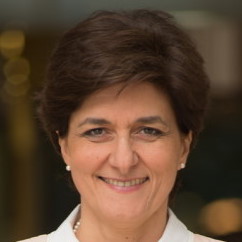
Sylvie Goulard
Deputy Governor, Banque de France
Sylvie Goulard was appointed second deputy governor of the Banque de France on 17 January 2018. Her portfolio includes international issues, research, public financial education and climate related financial stability issues. She served as Minister of the Armed Forces (May-June 2017) in the first government of President Macron. She carried out most of her career in European institutions. From 2009, she was Member of European Parliament. As a member of the Alliance of Liberals and Democrats for Europe (ALDE) group, she sat on the Parliamentary Committee on Economic and Monetary Affairs (ECON) where she served as coordinator/spokesperson for the ALDE group. She is the author of several books on Europe. Ms. Goulard holds a law degree from the University of Aix-en-Provence (1984). She graduated from the Institut d’études politiques in Paris (1986) and the Ecole nationale d’administration (1989).
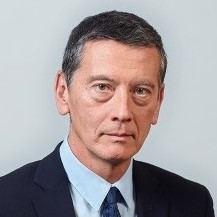
Luiz Pereira Da Silva
Deputy General Manager, Bank for International Settlements
Luiz Awazu Pereira da Silva became the Deputy General Manager of the Bank for International Settlements (BIS) in October 2015. Before joining the BIS, Mr Pereira da Silva, a Brazilian national, had been the Deputy Governor of the Central Bank of Brazil since 2010. Prior to that, he worked in various positions for the World Bank in Washington DC, Tokyo and southern Africa. He also served as Chief Economist for the Brazilian Ministry of Budget and Planning, and as Brazil's Deputy Finance Minister in charge of international affairs.
DAY 3 - SESSION 8. (LECTURES) THE GLOBAL ECONOMY POST-COVID
29 September 2021, Wednesday | 07:00-08:30 (MANILA) | 18:00-19:30 (CST, 28 September) | 19:00-20:30 (EST, 28 September) ≫
The session consists of three short lectures on post-pandemic global economic issues.


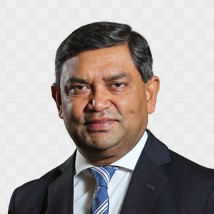
Mangal Goswami
Executive Director, Southeast Asian Central Banks (SEACEN) Research and Training Centre
Mangal Goswami is currently the Executive Director at The SEACEN Centre in Kuala Lumpur. He was the Deputy Director at IMF-South Asia Regional Training and Technical Assistance Centre in New Delhi. He also served as the Deputy Director of the IMF’s Singapore Regional Training Institute (STI) from June 2010 to December 2016. He has a range of experience with IMF macro and macro-financial capacity development work in Asia. Prior to joining the STI, he was a Senior Economist in the Monetary and Capital Markets Department of the IMF. Notably, he was a member of selected IMF working groups during the Global Financial Crisis. He participated in the IMF’s surveillance work on Large Complex Financial Institutions and was part of several Financial Sector Assessment Programs. Before joining the IMF, he was an Economist at ABN AMRO Bank in Singapore during the Asian Financial Crisis, and he served in the Research Department of the Federal Reserve Bank of Kansas City in the US.
THE US ECONOMY AND MONETARY POLICY
James Bullard
President, Federal Reserve Bank of St. Louis
James “Jim” Bullard is the president and CEO of the Federal Reserve Bank of St. Louis. In that role, he is a participant on the Federal Reserve’s Federal Open Market Committee (FOMC), which meets regularly to set the direction of U.S. monetary policy. Mr. Bullard received his doctorate in economics from Indiana University in Bloomington, and holds Bachelor of Science degrees in economics and in quantitative methods and information systems from St. Cloud State University in St. Cloud, Minnesota.

THE RESILIENT SOCIETY AND THE INTERNATIONAL MONETARY SYSTEM
Markus Brunnermeier

Edwards S. Sanford Professor of Economics, Princeton University
Markus K. Brunnermeier is the Edwards S. Sanford Professor at Princeton University. He is a faculty member of the Department of Economics and Director of Princeton's Bendheim Center for Finance. He is also a research associate at NBER, CEPR, and CESifo and a member of the Bellagio Group on the International Economy. He is a Sloan Research Fellow, Fellow of the Econometric Society, Guggenheim Fellow and the recipient of the Bernácer Prize granted for outstanding contributions in the fields of macroeconomics and finance. Mr. Brunnermeier received his Ph.D. from the London School of Economics (LSE). His forthcoming book is titled "The Resilient Society". His research focuses on international financial markets and the macroeconomy with special emphasis on bubbles, liquidity, financial and monetary price stability. He has been awarded several best paper prizes and served on the editorial boards of several leading economics and finance journals. He has tried to establish the concepts on liquidity spirals, CoVaR as systemic risk measure, the Volatility Paradox, Paradox of Prudence, ESBies, financial dominance, the redistributive monetary policy, the Reversal Rate, and Digital Currency Areas.
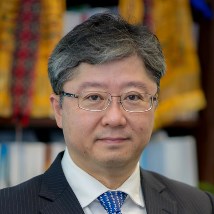
FINANCING A GREEN AND INCLUSIVE RECOVERY IN ASIA AND THE PACIFIC
Yasuyuki Sawada

Professor of Economics, University of Tokyo
Former Chief Economist, Asian Development Bank
Yasuyuki Sawada is Professor at the Faculty of Economics, University of Tokyo. From March 2017 until August 2021, he was Chief Economist of the Asian Development Bank and Director General of its Economic Research and Regional Cooperation Department. He was chief spokesperson on economic and development trends and led the production of ADB’s flagship knowledge products and support for regional cooperation fora. He has worked with well-known development and economic organizations, among them JICA, the World Bank, Economic Research Institute of ASEAN and East Asia (ERIA), Pakistan Institute of Development Economics (PIDE), and Bangladesh Institute of Development Studies (BIDS). His key research areas are development economics, microeconometrics, economics of disasters, and field surveys and experiments. Mr. Sawada obtained his Ph.D. in Economics from Stanford University.
29 September 2021, Wednesday | 08:30-08:50 (MANILA) | 02:30-02:50 (CET) ≫



Marc Uzan
Executive Director, Reinventing Bretton Woods Committee
Marc Uzan is the Executive Director and founder of the Reinventing Bretton Woods Committee (RBWC), a not-for-profit organization established in 1994 that focuses on addressing issues related to the international financial architecture. Mr. Uzan has edited several volumes on international finance including the most recent volumes entitled “Bretton Woods: The Next 70 Years” and “The 10 Years After: The End of the Familiar” with contributions by major economic experts. He also authored academic papers on the new architecture for the international financial system and has written extensively about economics and finance in the popular press. Mr. Uzan holds a master’s degree in International Economics and Finance from the Université de Paris IX Dauphine. He had been a visiting scholar at the Department of Economics of the University of California, Berkeley and a visiting fellow at Harvard University.
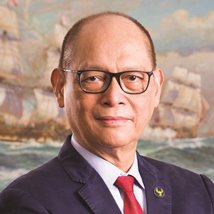
Benjamin Diokno
Governor, Bangko Sentral ng Pilipinas
Dr. Benjamin E. Diokno is the Governor of the Bangko Sentral ng Pilipinas (BSP). Prior to his appointment, he served as Budget Secretary in three different administrations.
As Governor, he does not only pursue the promotion of the BSP mandates of price stability, financial stability, and an efficient payments and settlements system; but also endeavors to bring central banking closer to the people. He champions financial inclusion through digital payments and aims to shift 50% of retail payment transactions to digital form and achieve 70% transaction account ownership among adult Filipinos by the end of his term.
